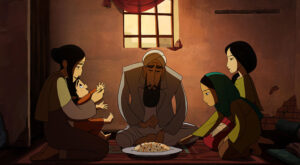The Breadwinner is both universal and deeply personal, about the healing power of stories and countless struggles women face in an unequal society.
Irish animator and filmmaker Tomm Moore’s spectacular hand-drawn fables The Secret of Kells (2009) and Song of the Sea (2014) were worth mentioning in the same breath as the distinctive works of major studios. A decade before The Secret of Kells, Moore had found Cartoon Saloon animation studio. This small yet vibrant community of animators quickly built up an impressive body of work, including short-films and commercials. These animated works were a hybrid of digital animation and traditional hand-drawn techniques. The skillful method made it look even more like a timeless painting with a number of layered details.
Nora Twomey’s 2002 short film From Darkness is one such early example. Twomey later co-directed The Secret of Kells. Subsequently, she headed the art department in Song of the Sea. Now with the Oscar-nominated The Breadwinner (2017), an animated adaptation of Canadian author Deborah Ellis’ bestselling children’s novel, Twomey once again conjures a sense of wonderment through the lyrical simplicity of hand-drawn images.
Related: Mustang (2015) Review: A Poignant Tale of Woman Empowerment
The Breadwinner, similar to the benchmark works of Irish animation studios, seamlessly interweaves local folklore beliefs with the universality of their characters and struggles.
Cinema has concocted several stories of women disguised as men to get by in public spaces; to seek fresh opportunities they otherwise can’t get. Most of those cross-dressing narratives are largely designed to evoke laughs. Such disassociation with gender identity is rarely perceived with sociopolitical relevance. Siddiq Barmak’s powerful Afghani film Osama (2003) revolved around a pre-teen girl, living under the notorious Taliban regime. The girl is forced to disguise as a boy in order to support her family.
Canadian author Deborah Ellis’ 2000 children’s novel (aimed at children above 8) boasts a similar set-up. It introduces us to 11-year-old Parvana, living with her family in a bombed-out Kabul apartment. The Breadwinner was the first of the series to follow Parvana’s survival, friendship, and sacrifice under the Taliban persecution.
Nora Twomey’s animated version of The Breadwinner was an Irish-Canadian co-production (Angelina Jolie came on-board as ‘executive producer’). It was acquired by GKIDS, the New York-based distributor of wonderful indie animation features. Simple yet poignantly animated, this internationally collaborative product delicately balances the tale’s universality and specificity. The lead character is Parvana, a feisty individualistic preteen girl, who accompanies her disabled father Nurullah to the market. Here they try to sell their family possessions to procure food. When Nurullah is thrown into prison for no reason, the family is devastated. Mother Fattema and elder sister Soraya can’t appear in public without a male guardian. When the mother tries to see her imprisoned husband, she is beaten badly by a Taliban. The only living son of the family is a toddler named Zaki.
So, Parvana decides to support the family by cutting her hair and dressing up as a boy. She puts on the clothing of her dead brother Suleyman and does odd jobs alongside Shauzia. Shauzia is a former school friend who’s also living publicly as a boy. Another crucial aspect of Parvana is that she is a storyteller. She weaves tall tales to soothe her little brother. And to steel herself from facing wicked things. Gradually, The Breadwinner becomes much more than a simple tale of Taliban terror. It correspondingly pays timeless tribute to the power of storytelling tradition that assuages the brutality of reality.
Although labeled as a ‘children’s story’, the narrative itself is often tragic and a bit intense for kids. Nevertheless, the rich characterization of Parvana plus the hope and imagination she boasts eventually bring the target audience more gratification than misery.
Deborah Ellis’ Parvana is quite unique and at the same time universal. The script is full of small yet nuanced observations, chronicling Parvana’s flourishing imagination alongside her freedom of movement. Through stories, she finds new possibilities in her circumscribed life.
Stories extract hope out of these desperate times and also forge an identity for the girl. Parvana’s simple journey depicts how literacy, ideas and imagination are at the heart of any truly civilized community. The episode involving Parvana and an illiterate man (whose only connection to his deceased loved one is a letter he can’t read) showcases the stagnancy of thoughts and ideas. By pointing out the words that represent his loved one’s name, Parvana kind of transforms the man. It’s an interesting moment which speaks of the power of the written word leading to initiate the transmission of thoughts.
The animation and character drawing is simple. Yet, it manages to evoke so much in so few lines. With large, naturalistic darting eyes, Parvana exudes humanity and deeply pulls us into the story. The fable Parvana tells her younger brother in bits and pieces (about a boy who fights the evil Elephant King) is full of vivid, breathtaking imagery reminding us of the colorful scenery in The Secret of Kells and Song of the Sea. While the Kabul setting is gritty and contains a pared-back palette, the story world is rife with visuals of arresting beauty.
Saara Chaudry’s vocal performance for Parvana was equally brilliant. The 13-year-old performer efficiently builds her character by organically squeezing in emotions from each of the lines.
Altogether, The Breadwinner (93 minutes) is a substantial indie animated feature, one that is both universal and deeply personal, about the healing power of stories and countless struggles women face in an unequal society.

